AADL Acts on Communications, Facilities
Ann Arbor District Library board meeting (Jan. 21, 2013): Efforts to develop a communications plan and to review the needs of all library facilities were among the items addressed at the library board’s first meeting of 2013.
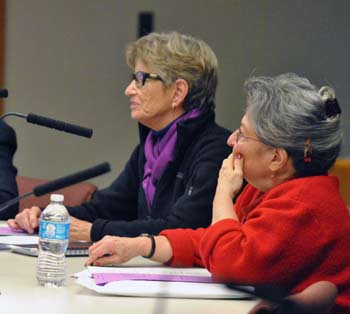
From left: Prue Rosenthal, the new president of the Ann Arbor District Library board, and board member Barbara Murphy. The seven-member board elected new officers at its Jan. 21, 2013 meeting. (Photos by the writer.)
The board voted unanimously to create two special committees – for facilities and communications. The efforts can be tied to a defeated bond proposal on the Nov. 6 ballot, which the AADL board had hoped would fund a new downtown library.
Both topics were touched on during public commentary, too. Two local architects – Sahba Laal and George Kachadoorian – told the board they’ve prepared a proposal for renovating and perhaps adding to the downtown library building. They hope to present their ideas at a future board meeting. Also during public commentary, Lou Glorie urged the board to consider moving its meeting dates, which typically fall on the same evening as Ann Arbor city council meetings. She also suggested that the meetings be recorded for viewing on Community Television Network (CTN) – an idea that the majority of board members rejected when Nancy Kaplan proposed it nearly two years ago.
In contrast, Kaplan’s most recent proposal – to hold three board meetings this year at library branches, rather than at the downtown location – won unanimous support from the board. The change is intended to make it easier for the public to attend, and to showcase the branches. Those branch meetings will be held at: (1) the Traverwood branch at 3333 Traverwood Drive, at the intersection with Huron Parkway (June 17); (2) the Pittsfield branch at 2359 Oak Valley Drive (July 15); and the Malletts Creek branch at 3090 E. Eisenhower Parkway, east of Stone School Road (Sept. 16).
The Jan. 21 meeting included a swearing-in ceremony – officiated by Libby Hines, chief judge of the 15th District Court – for the four AADL board incumbents who were re-elected on Nov. 6, 2012: Nancy Kaplan, Margaret Leary, Rebecca Head and Prue Rosenthal. The seven-member board also held officer elections. Prue Rosenthal was unanimously elected president. Other officers are Jan Barney Newman (vice president); Nancy Kaplan (treasurer); and Rebecca Head (secretary).
Several members of the Protect Our Libraries group attended the Jan. 21 meeting. Formed in 2012 to oppose the AADL’s bond proposal for a new downtown library, the group subsequently organized as a political action committee (PAC). Kathy Griswold, who launched Protect Our Libraries, was among those present at the board meeting – along with Bob Rorke, who previously served on the Ann Arbor Public Schools board of education with Griswold. Griswold told The Chronicle that the PAC is hiring Rorke to conduct a financial analysis of the AADL.
Swearing In, Officer Elections
The four Ann Arbor District Library board incumbents who were re-elected on Nov. 6, 2012 were sworn in for another four-year term at the board’s Jan. 21 meeting. Libby Hines, chief judge of the 15th District Court in Ann Arbor, administered the oath to Nancy Kaplan, Margaret Leary, Rebecca Head and Prue Rosenthal.

15th District Court chief judge Libby Hines, left, was given a bouquet of flowers by AADL director Josie Parker before administering the oath of office to four incumbent board members elected on Nov. 6, 2012. Seated in the foreground is AADL board member Jan Barney Newman.
Before the ceremony started, AADL director Josie Parker presented Hines with a bouquet of flowers to show appreciation for her work, noting that Hines had received significant recognition over the past year.
That recognition included the American Judges Association’s decision last year to establish the annual Judge Elizabeth Hines Award, to honor judges who have developed innovative strategies to reduce domestic violence. Hines was also the first recipient of that award. She handles a specialized domestic violence docket as well as a street outreach court – a community program that she spearheaded to address issues related to homelessness and the criminal justice system.
Hines said it was a great honor to deliver the oath to people who have been elected to protect such a valuable community resource. She observed that it was fitting for this ceremony to occur on the same day as the presidential inauguration and Martin Luther King Jr. Day.
The four incumbents stood at the front of the boardroom while Hines administered the brief oath of office.
The meeting also included the election of new board officers. Before that took place, Leary – who has served as president for the past two years – gave some remarks. She said she didn’t want to describe the huge accomplishments of AADL, because she didn’t want to take credit for those efforts. Rather, she wanted to thank the people who are responsible for AADL’s success, starting with taxpayers who approved the millage that brings in about $11 million of the library’s $12 million budget each year. She also thanked voters who have elected her to three terms, and individually thanked each of her board colleagues for their work. In her comments to Ed Surovell – the board’s longest-serving member – Leary thanked him for teaching her about the “human political animal.”
Leary thanked the nonprofit Friends of the Ann Arbor District Library and its president, Pat McDonald, as well as the group that had advocated for the Nov. 6 library bond proposal, led by Ellie Serras. Leary’s concluding remarks were directed to AADL staff, thanking several senior staff members individually and noting that Parker and her staff accomplish the library’s mission statement every day. [The AADL vision statement, mission statement and list of values is available on the library's website.]
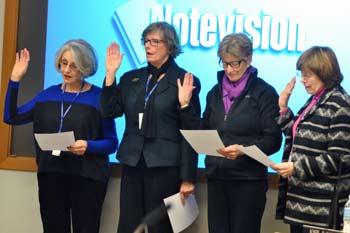
From left: AADL board members Nancy Kaplan, Margaret Leary, Prue Rosenthal, Rebecca Head are sworn in for new four-year terms. The four incumbents were re-elected on Nov. 6.
Leary received a round of applause from her colleagues and AADL staff, and Parker presented her with a bouquet of red roses. Parker noted that Leary usually gets the last word, but not this time. She said Leary had brought grace in her approach to board leadership, and has a way of speaking to people as though they are the most important person – it was much appreciated, Parker said. On behalf of the board, Rebecca Head also thanked Leary for her service as president.
The board then held officer elections for 2013. Prue Rosenthal, who has served as vice president for two years, was unanimously elected president. Other officers are Jan Barney Newman (vice president); Nancy Kaplan (treasurer); and Rebecca Head (secretary).
There were no competing nominations, and all votes were unanimous.
Board Committees
Several agenda items related to committee work for the AADL board, including resolutions to create two special committees in 2013 – for facilities and communications.
Board Committees: Facilities
The special facilities committee is a continuation of a committee that was originally formed at the board’s April 16, 2012 meeting. At that time, the purpose of the committee was to make a recommendation to the board regarding a possible new or renovated downtown building.
At the board’s July 16, 2012 meeting, that committee – consisting of Prue Rosenthal, Nancy Kaplan and Ed Surovell – recommended that the board place a bond proposal on the Nov. 6 ballot to fund a new downtown library. At that same July meeting, the committee’s charge had been amended to include recommending “measures needed to maintain the existing building should a bond to replace the downtown facility fail to pass.”
The $65 million, 30-year bond proposal was rejected by voters, with 41,359 votes (55.17%) against it and support from 33,604 voters (44.83%).
On Jan. 21, Rosenthal gave a very general report on the committee work, saying that it had met and discussed issues concerning the defeat of the bond proposal and how to continue efforts regarding library facilities. The committee’s work in 2013 will focus on all the library buildings and their needs, she said.
Later in the meeting, the board considered a resolution with a new charge for the special facilities committee: “to recommend to the Board steps needed to develop and maintain clean, safe, physical facilities that creatively meet the needs of the community and staff with an emphasis on sustainability, accessibility and flexibility.”
The only discussion on this item was a comment by Leary, who noted that the committee’s charge is taken directly from the AADL’s strategic plan.
Outcome: The board voted unanimously to form the special facilities committee for 2013. In a separate vote later in the meeting, the board voted to appoint Ed Surovell, Rebecca Head and Margaret Leary to serve on that committee. Leary will serve as chair.
The topic of library facilities was also touched on during public commentary at the start of the Jan. 21 meeting. Sahba Laal introduced himself and George Kachadoorian, saying they were two local architects who have prepared a proposal for renovating and perhaps adding to the downtown library building. They did not show the board any designs during public commentary, but Laal indicated that they hoped the board would consider their proposal at a future meeting.
Board Committees: Communications
The board also considered a resolution to create a special communications committee that is charged with making recommendations about a communications audit and plan.
There was no discussion about this item prior to the board vote. After the meeting, Margaret Leary told The Chronicle that the idea to form the committee evolved following the Nov. 6 election, and is a recognition that the AADL needed to do a better job of communicating its work to the public. The work might require hiring a consultant to help formulate a communications strategy.
Issues related to communications are also part of the board’s long-term strategic plan. The three communications goals identified in that plan are:
- Learn more about who is using the Library, who is not and why.
- Communicate the value and return on investment to the community from its district library, and how that return might be increased.
- Market library services to current patrons and non-users.
Outcome: The board voted unanimously to form the special communications committee for 2013. In a separate vote later in the meeting, the board appointed Nancy Kaplan, Margaret Leary and Ed Surovell to serve on the committee.
Board Committees: Appointments
During the meeting, a handout was distributed that listed proposed assignments in the board’s permanent standing committees:
- Budget and finance: Nancy Kaplan (chair), Barbara Murphy, Jan Barney Newman.
- Policy: Barbara Murphy (chair), Nancy Kaplan, Prue Rosenthal.
- Director’s evaluation: Prue Rosenthal (chair), Margaret Leary, Jan Barney Newman
- Executive: Prue Rosenthal, as board president, plus any two additional officers of the board.
In accordance with the Michigan Open Meetings Act, any meeting that includes a quorum of the board must be held in public, with specific exceptions allowed for certain topics to be covered in closed sessions. For AADL’s seven-member board, four members constitute a quorum. Because AADL’s committees have only three members each, the meetings are not required to be open to the public.
Outcome: In separate votes for each committee, the board voted unanimously to make appointments to its standing committees for 2013.
Outreach Efforts
In addition to creating a special communications committee, the board handled another agenda related to the general topic of community outreach – holding three of its 2013 board meeting in library branches, rather than the main downtown building. The issue of outreach was also addressed during public commentary.
Outreach Efforts: Public Commentary
Lyn Davidge told board members she was disappointed that the December 2012 meeting had been canceled. So many views have been expressed by the electorate regarding the library, she said, and there’s a vast public interest in the library and its downtown building. She felt that the library’s constituents deserve regular monthly updates on AADL finances and policy. It’s also important to hear regularly from the board’s special facilities committee, Davidge said.
Lou Glorie asked the board to consider holding its meetings on different nights, because in its typical schedule, AADL board meetings fall on the same night as Ann Arbor city council meetings. [AADL meetings are usually on the third Monday of the month, starting at 7 p.m. City council meetings are on the first and third Mondays, also starting at 7 p.m.] Glorie noted that the city council was not in session in observance of the Martin Luther King Jr. Day. The council’s meeting was held the following day instead. She asked that the library board be more sensitive to these holidays when scheduling its meetings.
Glorie noted that many people who attend the city council meetings would also like to attend AADL board meetings, but they can’t. For the sake of increasing citizen involvement, she said, it would help to hold the meetings on a different day. Glorie also encouraged the board to broadcast its meetings on Community Television Network (CTN), as are many public meetings in the city.
By way of background, CTN is a unit of the city of Ann Arbor, and broadcasts a wide variety of public meetings – including several that are held in the same boardroom as the library board meetings, on the fourth floor of the downtown AADL building. Meetings that are currently recorded by CTN in that room include the Ann Arbor Public Schools board and the Ann Arbor Transportation Authority board. At the AADL’s May 16, 2011 meeting, board member Nancy Kaplan brought forward a resolution to videotape monthly board meetings for broadcast. It was defeated on a 2-4 vote, with support only from Kaplan and Barbara Murphy. Ed Surovell was absent from that meeting. No trustees spoke about their reasons for voting against it, although board members had discussed it with AADL staff at the board’s April 25, 2011 session.
Glorie concluded her remarks by saying that she’s a member of the Protect Our Libraries group, and she looked forward to collaborating with AADL.
Protect Our Libraries formed in 2012 to oppose the AADL’s bond proposal for a new downtown library. The group subsequently organized as a political action committee (PAC). [.pdf of the PAC's statement of organization, filed on Dec. 11, 2012] Kathy Griswold, who launched Protect Our Libraries, also attended the Jan. 21 AADL meeting, along with Bob Rorke, who previously served on the Ann Arbor Public Schools board of education with Griswold. Griswold told The Chronicle that the PAC is hiring Rorke to conduct a financial analysis of the AADL.
Outreach Efforts: Board Meetings
On the Jan. 21 agenda was a resolution to hold three of its 2103 meetings at library branches. Typically, the board’s monthly meetings are held in the downtown library at 343 S. Fifth Ave.
The resolution was brought forward by Nancy Kaplan, who said she thought it was a good idea and hoped it would draw more attention to AADL meetings. The goal is to make meetings easier to attend, she said, and to highlight AADL’s different branches.
Jan Barney Newman recalled that in the past, some board meetings had been held in branches. AADL director Josie Parker confirmed that this was true, but it did not happen on a regular basis.
This year, the proposal called for meetings to be held at: (1) the Traverwood branch at 3333 Traverwood Drive, at the intersection with Huron Parkway (June 17); (2) the Pittsfield branch at 2359 Oak Valley Drive (July 15); and the Malletts Creek branch at 3090 E. Eisenhower Parkway, east of Stone School Road (Sept. 16).
In a separate item, the board was asked to adopt the 2013 meeting schedule. [.pdf of 2013 meeting schedule]
Outcome: The board unanimously approved its 2013 meeting schedule, as well as a resolution directing that three meetings be held at library branches.
Financial Report
In a standard agenda item, Ken Nieman – AADL associate director of finance, HR and operations – gave a brief financial update to the board. Because the board had canceled its December 2012 meeting, this month’s presentation included reports for the months of November and December. [.pdf of November 2012 financial report] [.pdf of December 2012 financial report]
Nieman highlighted a $40,000 donation made to AADL by the nonprofit Friends of the Ann Arbor District Library, which operates a used bookstore in the lower level of the downtown library building.
By Dec. 31, 2012 the library had received nearly 97% of its budgeted tax revenues for the year, or $10.86 million. The library’s unrestricted cash balance was $13.2 million as of Dec. 31, with a fund balance of $8.07 million. Four line items are currently over budget: communications, materials, software, and a line item for “other operating expenses.” All are expected to come back in line with budgeted amounts by the end of the fiscal year, Nieman said.
Board members had no questions about the financial report.
Director’s Report
AADL director Josie Parker began her report by showing a video annual report for the library’s 2011-12 fiscal year. The six-minute video features clips from programs and speakers hosted by AADL, as well as describing new online services and content that’s available for circulation.
Parker also highlighted several items that were included in her written report: [.pdf of January 2013 director's report]
- As part of its annual program to bring second-grade students to the library, this fall 56 classes with 1,278 students came to the library, and 511 library cards were issued. The Friends of the AADL paid for bus transportation for this program, which is designed to introduce students to the public library.
- The Washtenaw Library for the Blind and Physically Disabled at AADL received commendations from the Regional Librarian for the state’s Bureau of Services for Blind Persons, following a site review. The WLBPD@AADL was also recognized for best practices by the National Library Service in its December 2012 newsletter.
- Cynthia Page-Bogen, a Burns Park Elementary music teacher, and local singer/songwriter Joe Reilly highlighted AADL’s Library Songsters program at the Michigan Music Conference this month. The Library Songsters is described on AADL’s website as a program that “brings folk musicians, storytellers and dancers into our public schools to teach these traditional arts to students.” It’s been spearheaded by Ira Lax of AADL’s outreach and neighborhood services staff.
Human Resources Report
DeAnn Doll, manager of finance/human resources for AADL, gave a brief presentation to the board at the Jan. 21 meeting. She described information that was also provided in a three-page handout. [.pdf of HR handout] The handout included an organizational chart, a chart showing the general compensation structure for AADL jobs, and definitions of AADL “regular” and “casual” employees – categories that are typically referred to in other organizations as full-time and part-time positions, respectively.
As of Dec. 31, 2012, the library employed a staff of 227 people.
Board members had only a few questions for Doll. Leary asked how many employees were represented by a union – Doll didn’t have that information immediately at hand. Leary also wondered how many people worked in the different types of positions. Doll went through the entire org chart, listing out the number of people in each group. The largest categories of employees are “casual” staff – defined as employees who work 16-19 hours per week – in the categories of bookshelvers/processors (55 employees), circulation/branch clerks (26), and information desk clerks (20).
In response to another query, Doll noted that the compensation structure had been completed in 2008 and that it would be updated this year.
Present: Rebecca Head, Nancy Kaplan, Margaret Leary, Barbara Murphy, Jan Barney Newman, Prue Rosenthal, Ed Surovell. Also AADL director Josie Parker.
Next meeting: Monday, Feb. 18, 2013 at 7 p.m. in the fourth-floor conference room of the downtown library, 343 S. Fifth Ave. [Check Chronicle event listing to confirm date]
The Chronicle relies in part on regular voluntary subscriptions to support our coverage of public bodies like the Ann Arbor District Library board. Check out this link for details: Subscribe to The Chronicle. And if you’re already supporting us, please encourage your friends, neighbors and colleagues to help support The Chronicle, too!




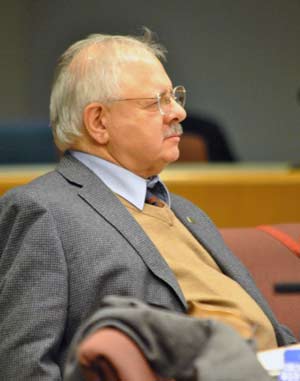
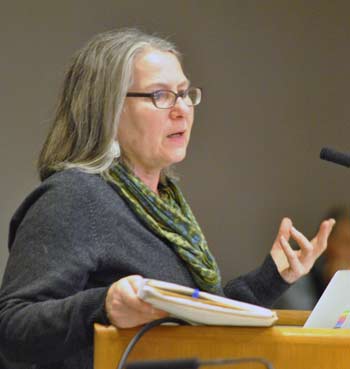
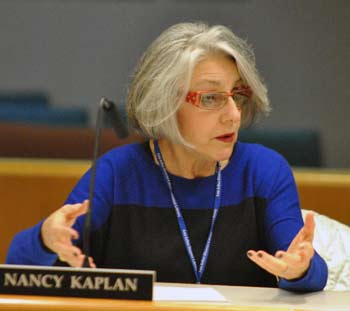
We are fortunate to have an award winning, well financed public library system. While voters rejected the proposal to build a new downtown library building, they also elected all of the incumbent Board members to serve another term. Let’s hope the Library Board remains focused on providing great services.
One problem the Library bond proponents identified in their failed effort to pass the library bond was a failure to clearly communicate to the public the need for a new building. The Board could easily address improvements to community outreach.
I hope the Board listens closely to Lou Glorie’s requests for better meeting scheduling and public broadcast of those meetings. These small steps would improve Board communication with the community as well as improve public trust.
Frankly, I consider the AADL’s decision not to broadcast meetings, when they are held in a facility with the capability, to be arrogant and inexcusable. Broadcasting the meetings would presumably also make them accessible via video recording, as are the meetings of virtually every other public body in Ann Arbor.
As the story indicates, the reasoning behind the decision not to make board meetings more accessible was never explained. We are left to draw the conclusion that they do not welcome public scrutiny.
One problem the library bond proponents have is failure to understand that information storage and distribution is increasingly an online affair. A physical building, whether old, new or renovated is rapidly becoming an anachronism. It might make sense to keep the downtown “library” open as a day warming space for the wonderful Delonis set and other lost souls but why put any money into it or keep toilet paper degreed professionals on the payroll?
“At the AADL’s May 16, 2011 meeting, board member Nancy Kaplan brought forward a resolution to videotape monthly board meetings for broadcast. It was defeated on a 2-4 vote, with support only from Kaplan and Barbara Murphy. Ed Surovell was absent from that meeting. No trustees spoke about their reasons for voting against it, although board members had discussed it with AADL staff at the board’s April 25, 2011 session.”
If the Library Board wants the support of the community for future projects, they might want to rethink this failure to understand the value of being more open and transparent. A step in that direction would be to broadcast or tape all future Library Board meetings. The fact them seem to continue to stonewall this easy fix with ‘communications’ being a focus is troubling.
What #1, #2, #3, #4 said.
The blue hairs in the wheelhouse of the taxpayer financed AADL flagship believe they are royalty imbued with powers and navigational charts given by heaven.
Pooh pooh, and tut tut. The AATA crowd still tops them for arrogance and gross mismanagement.
And then we have the Augean Stables of the city council and county government to consider.
Who among is up to the cleaning job? Tis better to light a single candle than to curse the darkness.
I looked up the Chronicle’s coverage of the April 2011 AADL board meeting. There were several reasons given for not broadcasting the meetings. One is that there is a conflict with the City Council meeting, so the AADL meeting would have to be taped for later broadcast rather than broadcast live. Another was that in 22 years no one had ever asked the library to do this. There were also concerns about quality, scheduling, and the fact that CTN, not AADL, would own the tape. Cost is not an issue. This explanation was from staff, not the board members.
Sorry, Chronicle, if I got any of that wrong. The 2011 meeting coverage is here: [link]
If the Board wants this to be an issue moving forward that will color their dealings with the public, then I hope they’ve done a careful costs vs. benefits analysis. Their judgement on the new library building millage would suggest they haven’t always done this in the past. These ‘reasons’ for not recording meetings are the same ones used by folks in the past who are opposed to open and transparent government. They should seriously rethink this issue–it’s not going away.
Until the Chronicle began covering AADL board meetings, this body operated in obscurity, with very little public notice. Apparently they liked it that way.
I just consulted the minutes of the November 19, 2012 meeting, the last one posted. (There was no December meeting.) These are what are referred to as “action minutes”, barebones reports of actions taken with no discussion reported. The exception was that public comment was reported in full. Thus, without the Chronicle’s coverage, there would be no record of comments and discussion from board members at meetings.
Thank you again for this reporting. It is a real service.
Barnes & Noble have just announced plans to start closing stores due to the shift from paper to digital books, story on today’s Yahoo news page. The library should follow in their path, start downsizing, the main questions being how fast and how far, like to complete closing in five years or perhaps down to a few residual functions, such as local archives, in ten? Perhaps downtown should be kept as a Delonis extension but don’t bother to renovate or even repair, that clientele is used to sleeping under bridges, also pink slip all the librarians, the Delonis set isn’t there to do research.
@ Board Committees: Communications, referring to comments by Margaret Leary: “… the idea to form the [Communications] committee … is a recognition that the AADL need[s] to do a better job of communicating its work to the public. The work might require hiring a consultant to help formulate a communications strategy.”
It seems to me that the Library already communicates quite forcefully and often the work it feels should impress the public and which the public should unquestioningly support. What the Library and the Board do much less effectively is actively listen to the public and make it as easy as possible for the public to offer input. Holding Board meetings in branches is a good, if modest, start. Adding a second citizen comment period at the end of Board meetings (as I proposed to the Board in November) would cost nothing and provide the Board and Administration with immediate feedback. It does not require paying a consultant or devising a “communications strategy” to summon up some other common sense ways to convey to the taxpayers a willingness to listen, learn, and heed their concerns. One good brainstorming session, followed by robust discussion of the best options in an open Board meeting, followed by immediate implementation should do it!
(#9)I think getting rid of paper books would be short-sighted and regretted sooner rather than later. Not to mention the lack of research on brain effects and retention due to reading on computer screens:
[link 1]
[link 2]
…this is placing a $100+ barrier between readers and books. Then forced onto the endless upgrade cycles by the companies that sell them. How many iterations of the iPod have there been in 15 years? Can you even still use your first iPod? Probably not. They also need steady access to internet and electricity to function, another barrier.
Not saying people shouldn’t get their books that way, just saying you should not force everyone to get their reading that way. Imagine that manufacturing and supporting these e-readers may not last past the end of the cheap oil era. Not to mention the impending shortage of the precious metals required AND the environmental implications of their manufacture (which are significant).
But once you destroy the books, they are gone for good. Libraries are one of the last refuges from full dependence on the corporate world. You can still read a book for free thanks to libraries.
Fahrenheit 451? As Bruce Springsteen said, “That stuff is never as far away as you think it is.”